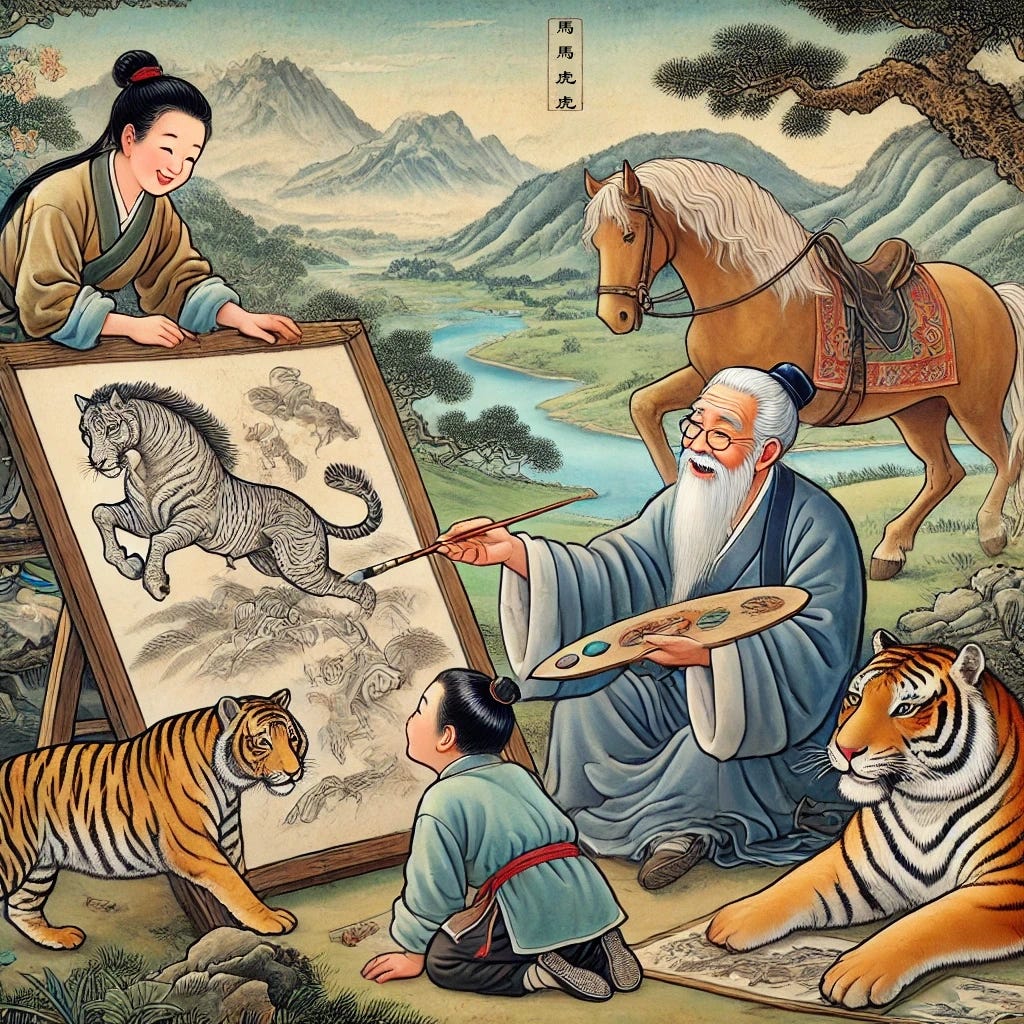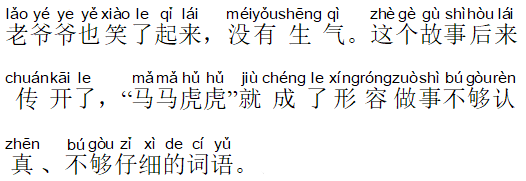"Almost anyone who has studied basic Chinese will have encountered the popular idiom “马马虎虎” (Horse-Horse Tiger-Tiger). In Chinese, such idioms are called “成语 (chéng yǔ),” and each one has a story behind it, known as a “典故 (diǎn gù).”
As we finished working through “画龙点睛,” one of my students made a specific request for our next lesson — “The story of 马马虎虎.” So, I set out to find a version suitable for his language level.
After some research, I found this version that I’m sharing here — a simplified story of the origin of the Chinese idiom “马马虎虎.”
请注意:如果你是母语者,请通过Substack留言指出错别字或语法问题,以便保持帖子质量。
感谢合作!
《马马虎虎的故事》
从前,有一个喜欢画画的老爷爷,他特别擅长画马和老虎。有一天,小朋友们来找他,请他画一匹马和一只老虎。
老爷爷高兴地答应了,没多久,他用心地分别画了一匹马和一只老虎。小朋友们围过来看画,他们觉得这幅画很特别。
可是细看后,小朋友们发现,画中的马有点像老虎,而老虎又有点像马。于是他们笑着对老爷爷说:“老爷爷,您画得马马虎虎啊!”
老爷爷也笑了起来,没有生气。这个故事后来传开了,“马马虎虎”就成了形容做事不够认真、不够仔细的词语。
这个故事告诉我们,做事情要用心,否则就会“马马虎虎”哦!
Story breakdown by paragraph with vocabulary and audio
从前 = once upon a time
老爷爷 = an old man
特别 = especially, special
匹 = (measure word for horses)
擅长 = to be skilled at
答应 = to agree, accept a proposal
没多久 = not long after
用心地 = intentionally, carefully
分别 = to divide, separate (分别画了 = to paint separately)
围过来 = to gather around
幅 = (measure word for a painting, or scroll)
Let’s take a closer look.
The English translation shows the characters following English, arranged by meaning.
The old man 老爷爷 happily 高兴地 agreed 答应了, not long after 没多久, he 他 carefully 用心地 painted 画了a horse 一匹马 and 和 a tiger 一只老虎 separately 分别. The children 小朋友们 gathered around 围过来 to look at 看 the painting 画. They 他们 felt 觉得 this painting 这幅画 was very special 很特别.
发现 = to notice, realize
画中的马 = the horse in the painting
于是 = and then
马马虎虎 = vague, careless, so-so
生气 = to get angry
传开 = to be shared around, passed around
形容 = to describe
做事 = to do things, to work
不够认真 = to not be serious enough, not conscientious enough
仔细 = careful, detailed
词语 = a phrase, saying
Let’s take a closer look.
The English translation shows the characters following English, arranged by meaning.
The old man 老爷爷 also 也 began to laugh 笑了起来, he wasn’t angry 没有生气. This story 这个故事 later 后来 was shared around 传开了,”Horse-horse, tiger-tiger 马马虎虎” became 就成了 a phrase 词语 to describe 形容 doing things 做事 haphazardly 不够认真, not 不 careful 仔细 enough 够.
用心 = diligent, to be diligent
否则 = otherwise
哦 = (expresses stating a fact other’s may not be aware of)
Character Radical:
月 = This is the “moon” or “meat” radical, 月字旁 (yuè zì páng) or 肉字旁 (ròu zì páng).
Moon Radical:
月 (yuè) means “moon.” The “moon” radical appears in characters related to time, light, or celestial bodies. For example:
明 (míng) - ”bright”
期 (qī) - a period of time
Characters in the reading with the moon radical are:
有 (yǒu) - “to have, there is, there are”
朋 (péng) - ”friend”
Meat Radical:
月 (肉 ròu) means “meat.” The “meat” radical is common in characters related to the body, flesh, or health. For example:
肝 (gān) - “liver”
背 (bèi) - “back (of body)”
腿 (tuǐ) - “leg”
肩 (jiān) - “shoulder”
Determining the Meaning:
To determine whether 月 represents "moon" or "meat," consider the context and meaning of the entire character.
Yin-yang Character Groups:
问答 (wèn dá) = ask-reply; Q&A
粗细 (cū xì) = thick-thin; thickness
📜 Exploring Classical Chinese Thought through GPTs
Check out these free AI tools that I built for learning Chinese classical thought! If you’re open to the possiblities of AI, you’ll be amazed with these.
They’re free to use, not commercial, and all draw directly from Chinese-language source materials.
Here are a few:
🪷 三宝使者 – The Three Pillars
Guided exploration of Confucian, Daoist, and Buddhist teachings, using native-written texts and conversational prompts.
📘 易经通 – I Ching Companion
Accesss the wisdom of the Yijing through the lens of respected thinkers like 鲁洪生 (Mainland) and 曾仕强 (Taiwan).
📚 一日一成语 – A Daily Idiom Learner
Study classic 成语 (idioms) with cultural and usage notes — one per day or as many as you like.
🌸 小金星星 – Tang Poetry & Language Study
A tool for exploring 唐诗 (Tang poetry), with a focus on rhythm, context, and cultural insight.
Thanks for reading Mapping Mandarin™! I love doing this and want to keep all posts free for everyone. Please consider pledging to help keep them free. A yearly pledge or even a month now and then would be a great help. 感谢!
Also, check out my other Substack: Heart Of China Journal!
And the Master Mandarin YouTube channel!














My Mandarin is still not good enough to read through the whole story (probably know 50% of the characters) but the pinyin and English translation make it an excellent practice even at my level - and so much interesting vocabulary!
Cultural references like this make me want to learn Chinese even more - to be able to understand China and its people.
Thanks Todd!